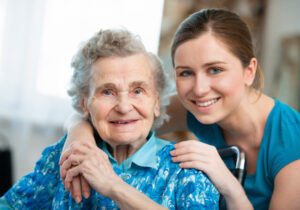Caregiver Communication with Older Adults Who Have Cognitive Impairment
Communication is key. Even more so when caring for an older adult with cognitive impairment or short-term memory loss. Communication can make a tremendous difference in their emotional well-being and quality of life. Effective caregiver communication is not just about exchanging information, it’s about preserving dignity, reducing frustration, and building trust.
Poor communication with older adults can lead to feelings of depression, withdrawal, or even complete silence. For those living with conditions like dementia or Alzheimer’s disease, thoughtful communication techniques are essential. Maintaining meaningful connections and fostering a sense of security is essential for supporting the well-being of older adults.
Below are our seven strategies to strengthen caregiver communication with older adults experiencing memory or cognitive challenges.
1. Maintain Structure and Consistency
A predictable daily routine helps older adults feel safe and less anxious. Consistency in meals, activities, and care interactions reinforces familiarity, which can be especially important for someone with memory loss. Caregiver communication works best when paired with regularity. Using the same phrases, greeting them in the same warm way, and keeping changes to a minimum.
2. Avoid Arguments and Debates
It’s natural to want to correct forgotten facts. In communication with older adults who are cognitively impaired, arguing is counterproductive. Debates can escalate frustration and increase feelings of inadequacy. Instead, acknowledge their feelings and gently steer the conversation toward a neutral or pleasant topic.
3. Don’t Highlight Forgetfulness
Pointing out that someone is forgetting may feel harmless, but it can be deeply discouraging. In caregiver communication, it’s better to offer support than correction. For instance, if your loved one struggles to recall a name, you can fill in the blank naturally:
“Hi Dad, it’s Jacqueline.”
If he responds with surprise, you could add, “I just wanted to remind you of the beautiful name you gave me.” Similarly, “Dad, Sara, your caregiver, just arrived” can be a helpful cue that eases confusion without embarrassment.
4. Use Gentle Prompts and Labels
Prompts and environmental cues are powerful tools in communication with older adults. Labeling household items or placing a sign on the kitchen door can help with orientation. This not only supports memory but also fosters independence, which can be a major confidence booster. You cannot put a price on independence.
5. Never Speak About Them in Front of Them
One of the most respectful caregiver communication practices is to avoid talking about the person as if they are not present. If a discussion about their health or care must occur in their presence, ask first:
“Is it okay if I share a few updates with the doctor about how you’ve been feeling?”
If a medical provider ignores or talks over them, step in and redirect the conversation to include them. Ageism, whether intentional or not, should never be accepted.
6. Incorporate Written and Visual Communication
Signs, calendars, and checklists can be extremely effective in communication with older adults. A large-print daily schedule posted on the wall may help them feel more in control. Keeping a memory clock within their daily view can help remind them not only of the time, but also of the exact date. Simple written reminders like “Dinner at 6 p.m.” or “Your daughter is visiting today” can reduce confusion and anxiety.
7. Practice Redirection with Positive Memories
When an older adult becomes distressed or fixated on a negative thought, redirection can shift the emotional tone. Asking about pleasant long-term memories—“Mom, what sport did you play in high school?”—can engage their mind in a positive way. If they’re a sports fan, “How about those Cowboys?” can spark connection and joy. Redirecting isn’t dismissing their feelings… it’s helping them move toward a calmer, more comforting space.
Why Caregiver Communication Matters So Much
At its core, caregiver communication with older adults is about human connection. It’s about finding ways to express understanding, respect, and patience—even when the conversation is challenging. By combining empathy with practical strategies, caregivers can maintain meaningful relationships and help their loved ones feel valued.
Whether you’re a professional caregiver or a family member, every interaction is an opportunity to reinforce self-esteem, reduce anxiety, and preserve dignity. The right words, tone, and approach can turn a moment of confusion into one of comfort.
Caregiver communication is not just a skill—it’s an act of compassion. And when it comes to communication with older adults living with memory loss, compassion is often remembered long after words are forgotten.
Need Support with Communication with Older Adults?
If you or a loved one could benefit from the help of a dedicated caregiver, Assured In Home Care is here for you. Our compassionate team specializes in providing care that preserves dignity, reduces frustration, and builds lasting trust.
Discover how our personalized services can enhance communication with your loved one and bring greater peace of mind to your family. Contact us today to start creating a care plan that truly supports their well-being. Together, we can make every interaction meaningful.
Written by Jacqueline DuPont-Carlson, PhD, EdD, Gerontologist
For more questions, please contact an advisor at Assured In Home Care at (800) 925-7159.




